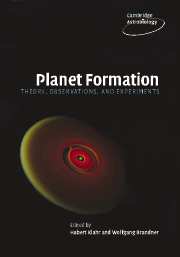Book contents
- Frontmatter
- Contents
- Preface
- Acknowledgments
- 1 Historical notes on planet formation
- 2 The Formation and Evolution of Planetary Systems: placing our Solar System in context
- 3 Destruction of protoplanetary disks by photoevaporation
- 4 Turbulence in protoplanetary accretion disks: driving mechanisms and role in planet formation
- 5 The origin of solids in the early Solar System
- 6 Experiments on planetesimal formation
- 7 Dust coagulation in protoplanetary disks
- 8 The accretion of giant planet cores
- 9 Planetary transits: a first direct vision of extrasolar planets
- 10 The core accretion–gas capture model for gas-giant planet formation
- 11 Properties of exoplanets: a Doppler study of 1330 stars
- 12 Giant-planet formation: theories meet observations
- 13 From hot Jupiters to hot Neptunes … and below
- 14 Disk–planet interaction and migration
- 15 The brown dwarf–planet relation
- 16 Exoplanet detection techniques – from astronomy to astrobiology
- 17 Overview and prospective in theory and observation of planet formation
- References
- Index
3 - Destruction of protoplanetary disks by photoevaporation
Published online by Cambridge University Press: 14 September 2009
- Frontmatter
- Contents
- Preface
- Acknowledgments
- 1 Historical notes on planet formation
- 2 The Formation and Evolution of Planetary Systems: placing our Solar System in context
- 3 Destruction of protoplanetary disks by photoevaporation
- 4 Turbulence in protoplanetary accretion disks: driving mechanisms and role in planet formation
- 5 The origin of solids in the early Solar System
- 6 Experiments on planetesimal formation
- 7 Dust coagulation in protoplanetary disks
- 8 The accretion of giant planet cores
- 9 Planetary transits: a first direct vision of extrasolar planets
- 10 The core accretion–gas capture model for gas-giant planet formation
- 11 Properties of exoplanets: a Doppler study of 1330 stars
- 12 Giant-planet formation: theories meet observations
- 13 From hot Jupiters to hot Neptunes … and below
- 14 Disk–planet interaction and migration
- 15 The brown dwarf–planet relation
- 16 Exoplanet detection techniques – from astronomy to astrobiology
- 17 Overview and prospective in theory and observation of planet formation
- References
- Index
Summary
Introduction
Planets form within circumstellar disks composed of a mixture of gas and dust grains. These disks result from the gravitational collapse of rotating molecular cloud cores. They are initially rather massive and consist of about 0.3 M*, where M* is the mass of the central star (e.g. Yorke et al., 1995). In contrast, the minimum mass required to build the planets of our Solar System is only about 0.01 Solar masses (M⊙). Evidently, there are processes that redistribute the mass, transform the dust to larger particles, and disperse much of the gas and dust.
The processes which are responsible for the dispersal of the gas influence the formation of planets. For example, the timescale for gas dispersal as a function of the disk radius affects the composition of the resulting planetary system. As long as the dust particles are small enough to be tightly coupled to the gas, they follow the gas flow. If the gas is dispersed before the dust particles have had a chance to grow, all the dust will be lost and planetesimals and planets cannot form. Even if there is time for particles to coagulate and build sufficiently large rocky cores that can accrete gas (Pollack et al., 1996; Hubickyj et al., 2004), the formation of gas-giant planets like Jupiter and Saturn will be suppressed if the gas is dispersed before the accretion can occur.
- Type
- Chapter
- Information
- Planet FormationTheory, Observations, and Experiments, pp. 31 - 41Publisher: Cambridge University PressPrint publication year: 2006
- 2
- Cited by

